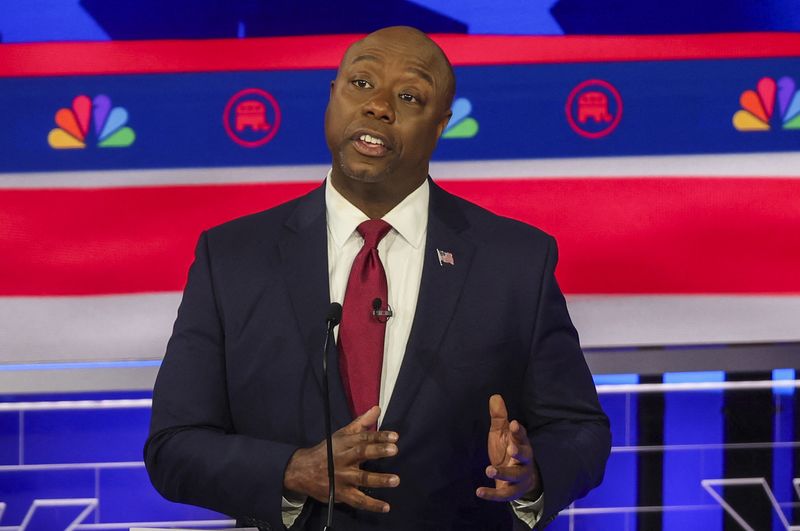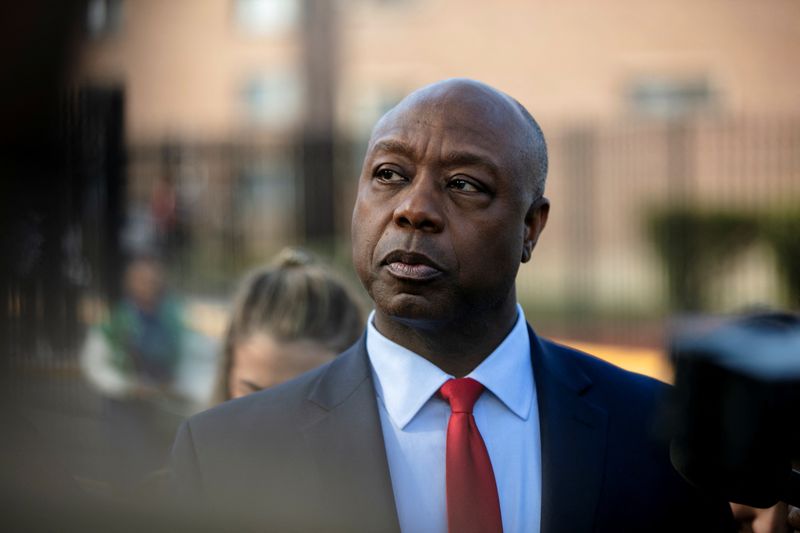By Gram Slattery and Alexandra Ulmer
WASHINGTON (Reuters) -U.S. Senator Tim Scott suspended his run for the 2024 Republican presidential election nomination on Sunday after months of burning through campaign cash at a blistering rate without making a significant dent in national opinion polls.
"I think the voters, who are the most remarkable people on the planet, have been really clear that they're telling me: 'Not now Tim,'" Scott told Fox News in an interview on Sunday evening.
His exit may provide a modest boost for other candidates trying to dislodge frontrunner and former President Donald Trump from the top spot, namely former U.S. Ambassador to the United Nations Nikki Haley.
In the moments after Scott dropped out, two major donors to his campaign told Reuters they would switch their support to Haley, who like Scott hails from the state of South Carolina.
The lone Black Republican in the U.S. Senate, Scott began his campaign in May, promising to present an optimistic, forward-looking vision for America. He portrayed himself as a deeply conservative candidate who was more capable of healing political divisions in the United States than Trump and Florida Governor Ron DeSantis.
While Scott enjoyed a modest, but measurable bump in opinion polls in some states over the summer, he failed to establish and defend a lane for himself in a relatively crowded field.
Like other candidates, he never articulated to Trump supporters why they should move on from the former president, who is still well liked by most primary voters.
Among the donors that supported Scott but are now switching to Haley's camp are metals magnate Andy Sabin and New York-based litigator Eric Levine.
Levine said he planned to host a fundraiser for Haley.
"I will support Nikki Haley enthusiastically," Levine said.
A third Scott donor, California-based commercial real estate banker Jeff Burns, said he had yet to make up his mind, but was leaning towards Haley.
ALWAYS A LONG SHOT
While Scott was always considered a long shot, he entered the race with some significant assets.
Many major donors supported him, in part because they believed he would have a high chance of beating Democratic President Joe Biden if he were to emerge as the Republican nominee. They were also turned off by DeSantis' often-confrontational attitude toward big business and opposition to U.S. involvement in the war in Ukraine.
During the first presidential debate in August, Scott failed to stand out, while Haley received plaudits from voters and donors for her combative performance. Subsequent debates proved similarly lackluster for Scott, who was soon surpassed by Haley in most state- and national-level polls.

Scott shifted tactics in the fall months and began adopting more confrontational rhetoric toward both Democrats and other Republican contenders. After the Oct. 7 attack by Palestinian militant group Hamas on Israel, for instance, he said that Biden had "blood on his hands" for failing to do more to prevent it, even as Israel itself was caught off-guard by the incursion.
That tonal shift had no effect on his polls, and may have even muddied the narrow lane he had tried to carve out. At the same time, Scott's finances began to deteriorate, an ominous sign for any presidential campaign.
